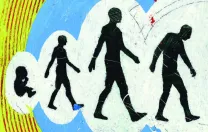David Sinclair, associate professor of pathology at Harvard Medical School, is often asked about sources for resveratrol. “The molecule you can buy at a store, or on the Web, is a plant extract of 50 percent unknown composition,” he says. In fact, when his laboratory discovered resveratrol’s role in yeast longevity, they tested the various products containing the molecule that were available on the market at the time, and were surprised to find that none had any resveratrol in them. “The molecule is very sensitive to light and air,” Sinclair explains, “and probably its shelf life is so short that by the time you buy it, it is gone.”
The highest levels of resveratrol available to consumers occur in red wines. The molecule, which is concentrated in the skins of grapes, is highly insoluble. But red wine is made from grapes processsed with their skins, and alcohol helps extract it. And because the wine is stored in dark, light-proof bottles, corked to keep oxygen out, the resveratrol is preserved. Sinclair doesn’t admit to taking resveratrol himself, since it hasn’t been tested in humans. “But,” he says, “I’ve switched from drinking white wine to red.”






